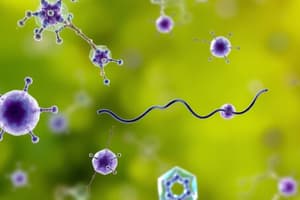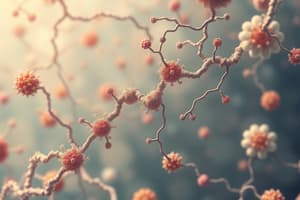Podcast
Questions and Answers
Do jakich związków chemicznych należą cukry, skrobia, celuloza i glikogen?
Do jakich związków chemicznych należą cukry, skrobia, celuloza i glikogen?
- Węglowodany (correct)
- Kwasy nukleinowe
- Białka
- Lipidy
Jaka jest rola lipidów w organizmach?
Jaka jest rola lipidów w organizmach?
- Są nośnikami informacji genetycznej
- Pełnią funkcje strukturalne w komórkach
- Są katalizatorami reakcji biochemicznych
- Są odpowiedzialne za magazynowanie energii (correct)
Z czego zbudowane są białka?
Z czego zbudowane są białka?
- Kwasy nukleinowe
- Lipidy
- Aminokwasy (correct)
- Węglowodany
Jakie związki chemiczne przechowują i przekazują informacje genetyczne?
Jakie związki chemiczne przechowują i przekazują informacje genetyczne?
Jaka jest funkcja węglowodanów w organizmach?
Jaka jest funkcja węglowodanów w organizmach?
Co to jest glikoliza?
Co to jest glikoliza?
Który proces biochemiczny generuje tlenek węgla jako produkt końcowy?
Który proces biochemiczny generuje tlenek węgla jako produkt końcowy?
Jakie mechanizmy regulacyjne kontrolują procesy biochemiczne?
Jakie mechanizmy regulacyjne kontrolują procesy biochemiczne?
Dlaczego zrozumienie szlaków metabolicznych jest istotne dla zdrowia człowieka?
Dlaczego zrozumienie szlaków metabolicznych jest istotne dla zdrowia człowieka?
Jaka rola pełni enzym katalazy?
Jaka rola pełni enzym katalazy?
Flashcards are hidden until you start studying
Study Notes
Exploring the Wonders of Biochemistry within the Realm of Chemistry
Biochemistry is an interdisciplinary field that combines the principles of chemistry and biology to understand the chemical processes within living organisms. It delves into the complex molecular structures and interactions that underpin life's fundamental processes. In this exploration, we'll delve into the fascinating world of biochemistry and its role in our understanding of chemistry.
Cellular Components and Biomolecules
At the heart of biochemistry are the cellular components and biomolecules that make up living organisms. These include:
- Carbohydrates: A diverse group of organic compounds that include sugars, starches, cellulose, and glycogen, which function as the primary energy source for cells and are involved in various other processes.
- Lipids: A group of fatty acid-derived molecules that include fats, oils, and phospholipids, which are essential for energy storage, cell membrane structure, and signaling processes.
- Proteins: Large, complex molecules made up of amino acids that serve diverse functions such as enzymes (catalysts of biochemical reactions), structural components, and signaling molecules.
- Nucleic acids: Double-stranded molecules that store and transfer genetic information, including DNA and RNA, which are central to the transmission of genetic information within cells.
Biochemical Reactions and Pathways
Life's processes are carried out through a series of biochemical reactions and pathways that are made possible by the previously mentioned cellular components and biomolecules. These reactions involve the synthesis, degradation, and transformation of these molecules, enabling living organisms to grow, reproduce, and maintain their internal environment. Several key pathways include:
- Glycolysis: A series of reactions that convert glucose into pyruvate, generating ATP, the cellular energy source.
- Citric Acid Cycle: Also known as the Krebs cycle or TCA cycle, this pathway generates ATP and plays a central role in the oxidation of acetyl-CoA to produce carbon dioxide, which is released from the cell.
- Photosynthesis: A critical process for plants and photosynthetic organisms that converts sunlight, carbon dioxide, and water into glucose and oxygen, providing energy and organic molecules for living organisms.
- Cellular Respiration: A series of reactions that convert energy-rich molecules such as glucose into ATP, releasing waste products such as carbon dioxide and water.
Regulation of Biochemical Processes
Biochemical reactions and pathways are regulated by various mechanisms to ensure the proper functioning of living organisms. These regulatory mechanisms include:
- Allosteric regulation: Changes in the shape of enzymes due to binding of allosteric effectors, which can increase or decrease their activity.
- Covalent modification: Addition or removal of functional groups to or from proteins, altering their activity.
- Gene regulation: Control of gene expression through mechanisms such as transcription and translation, as well as post-transcriptional and post-translational modifications.
Biochemistry and Human Health
Understanding biochemical processes has far-reaching implications for human health. For example, knowledge of:
- Metabolic pathways: Can help identify genetic mutations that result in metabolic disorders such as phenylketonuria (PKU) and sickle cell anemia.
- Cell signaling: Can help understand the molecular basis of diseases such as cancer, diabetes, and neurodegenerative disorders.
- Enzyme catalysis: Can lead to the development of drugs that target specific enzymes, such as penicillin and statins.
Biochemistry's role in understanding the chemical basis of life and its applications in human health make it an ever-growing and exciting field. With continuing advancements in technology and techniques, the future of biochemistry holds even more promise for discovering the mysteries of life and improving human well-being.
Studying That Suits You
Use AI to generate personalized quizzes and flashcards to suit your learning preferences.




